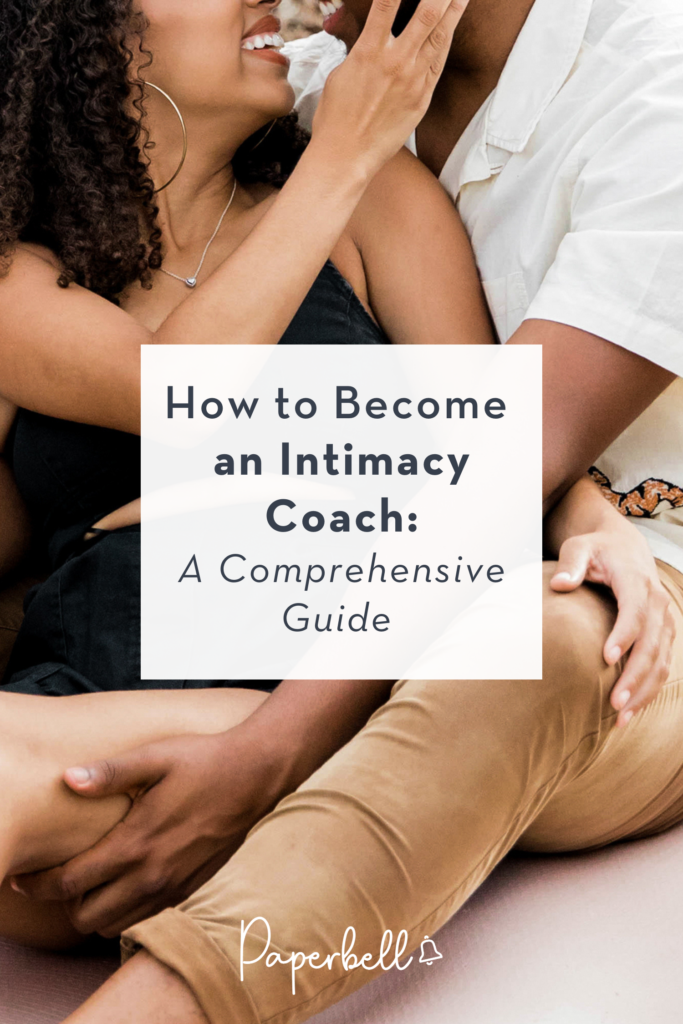When human connection feels more elusive than ever, intimacy coaches help people nurture meaningful relationships with others and themselves.
But what exactly does an intimacy coach do? How do you become one? And how do you build a successful business in this sensitive life coaching niche?
Let’s talk all about it.
What Does an Intimacy Coach Actually Do?
An intimacy coach helps clients develop the skills, awareness, and confidence for healthy intimate connections with themselves and others.
There’s a common myth that intimacy coaching is all about sex, but that’s only part of the picture.
Types of Intimacy Coaching
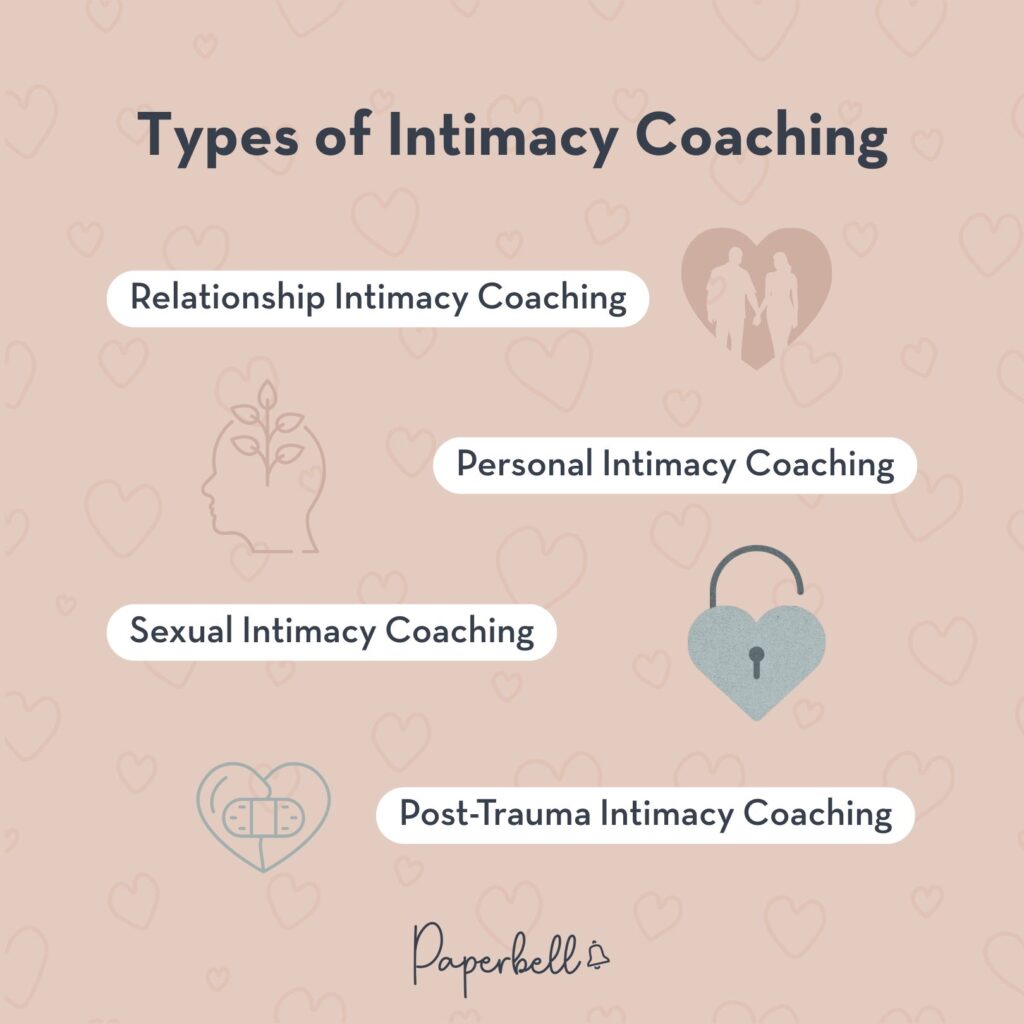
Intimacy coaching encompasses several specialized areas:
- Relationship Intimacy Coaching: A relationship intimacy coach helps partners communicate better about their needs, navigate conflicts, and rekindle the spark in their relationship.
- Personal Intimacy Coaching: This is about an individual’s relationship with themselves—helping them develop self-awareness, self-compassion, and comfort with their own body and desires.
- Sexual Intimacy Coaching: Sex coaching addresses communication about sexuality and desires and comfort with physical intimacy.
- Post-Trauma Intimacy Coaching: Some coaches specialize in working with individuals who have experienced trauma and are rebuilding healthy intimate relationships.
Intimacy Coaching in Popular Culture
The role of intimacy professionals has become more visible in recent years, particularly through the work of intimacy coordinators in film and TV.
Intimacy coordinators work on film sets, while intimacy coaches help people with their personal relationships—but both professions have helped normalize conversations about healthy intimacy.
Films like “Poor Things,” which won four Academy Awards in 2024, used intimacy coordinators to make sure actors felt safe and comfortable during intimate scenes.
Emma Stone, who won Best Actress for her role in the film, has spoken about how valuable this support was in creating a safe space for the film’s intimate content.
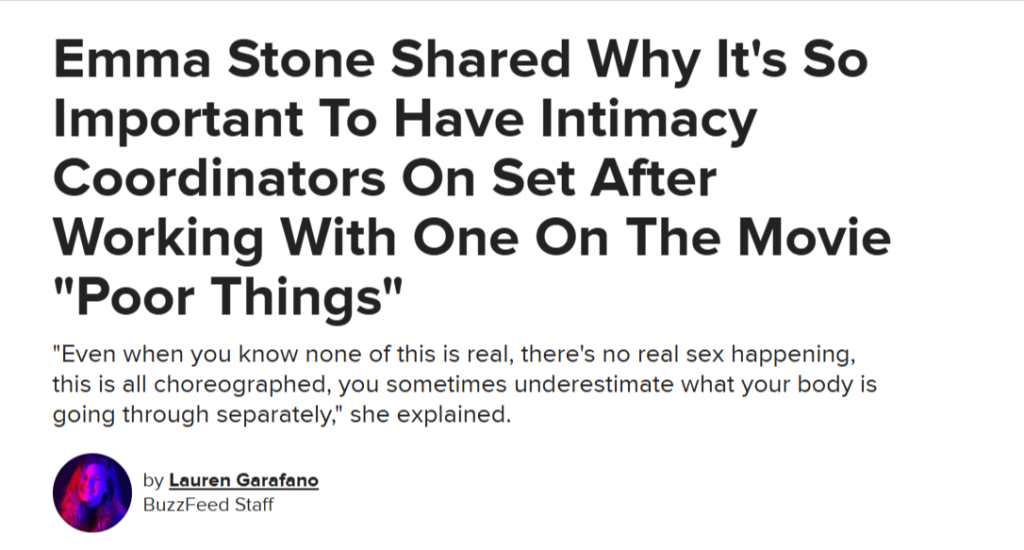
Source: BuzzFeed
Similarly, people praised the groundbreaking series “Normal People” for its realistic and respectful portrayal of intimacy, made possible through careful coordination and boundary setting—principles that intimacy coaches also use with their clients.
Common Client Concerns for Intimacy Coaching
Many people seek intimacy coaching for various reasons. Common client concerns include:
- Difficulty communicating needs and boundaries in relationships
- Disconnection from their own body or desires
- Long-term romantic relationship challenges
- Relationship betrayal or trauma recovery
- Sexuality or gender exploration
- Life transitions that affect intimacy (health changes, parenthood, aging)
- Cultural or religious conflicts around intimacy
Boundaries and Scope of Practice
As an intimacy coach, you need clear professional boundaries about what you do and don’t do. This is to protect you and your clients and to create a safe space for coaching.
What Intimacy Coaches Do:
- Educate and skill-building
- Guide and hold accountable
- Create a safe space for exploration and discussion
- Help clients set and communicate boundaries
- Suggest practices and exercises for intimacy skills
What Intimacy Coaches Don’t Do:
- Diagnose or treat mental health conditions
- Provide hands-on sexual services
- Process deep trauma (though they may work alongside therapists who do)
- Give medical advice
- Promise specific outcomes
Ethical Considerations of Intimacy Coaching
As an intimacy coach, you’re working with clients at their most vulnerable, often around topics shrouded in shame or confusion.
Here are some key ethical practices to make clients feel safe and supported:
- Get informed consent before any coaching activities
- Keep confidentiality
- Continue your own education and self-reflection
- Avoid dual relationships with clients
- Create a safe, inclusive space for all identities and backgrounds
Becoming an Intimacy Coach: Skills and Certifications
You need a unique combination of personal qualities, professional skills, and specialized training to become an intimacy coach.
Essential Skills for Successful Intimacy Coaches
Here are the core skills you need for intimacy coaching:
Communication Expertise
The foundation of intimacy coaching is communication, both modeling it and teaching it. You’ll need to work on:
- Active listening skills that make clients feel truly heard
- Clear, non-judgmental language around sensitive topics
- Ability to ask powerful questions that promote insight
- Comfort discussing taboo subjects without embarrassment
Empathy and Emotional Intelligence
Equally important is deep empathy and emotional intelligence. This will help you connect with clients’ feelings and navigate vulnerable emotional terrain with sensitivity.
You should:
- Recognize and regulate your own emotions
- Have deep empathy for clients’ experiences and expressions
- Hold space for vulnerability without trying to “fix” it
Professional Boundaries
More than any other coaching specialty, boundaries are key in intimacy coaching. You need to have clear ethical guidelines that protect you and your clients and create a safe space for exploration.
This might look like:
- Clarity around the coach-client relationship
- Awareness of your own triggers and blind spots
- Ethical protocols for attraction or transference
Cultural Competence
Having cultural competence means you can work with diverse clients. That’s because you:
- Know how different cultures approach physical and emotional intimacy
- Are aware of power dynamics in relationships
- Know different relationship structures and gender identities
Reputable Training Programs and Certifications
Several organizations offer reputable training to help you become a trained, certified intimacy coach. These include:
American Association of Sexuality Educators, Counselors, and Therapists (AASECT)
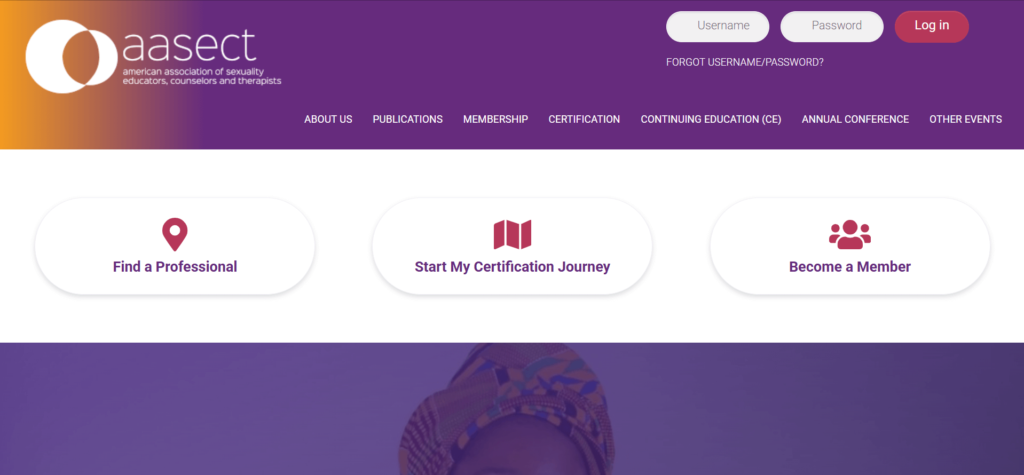
AASECT—the professional body for certifying sex and intimacy professionals in the United States—offers certification for sexuality educators, which can be useful for intimacy coaches. The core curriculum covers human sexuality education, sexual development, sexual orientation, gender identity, and ethics in sexuality practice.
Cost: Certification programs cost between $7,500 and $18,000 when including required coursework, supervision, and application fees.
International Coach Federation (ICF)
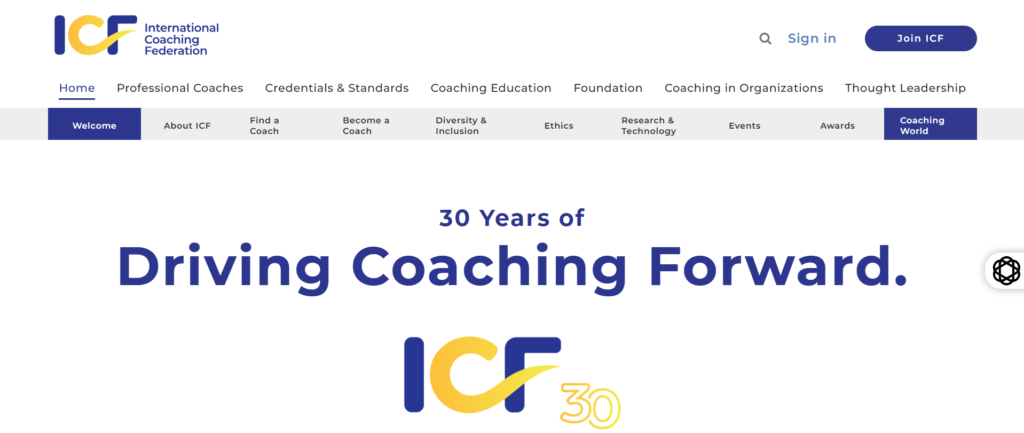
The International Coach Federation (ICF), the regulatory body for the coaching industry, provides general ICF coaching certification, which can be complemented with intimacy training. The curriculum focuses on core coaching competencies, ethical guidelines, and professional standards applicable across coaching disciplines.
Cost: Certification programs range from $4,000 to $7,500, depending on the level of certification (Associate, Professional, or Master).
Relationship Coaching Institute (RCI)
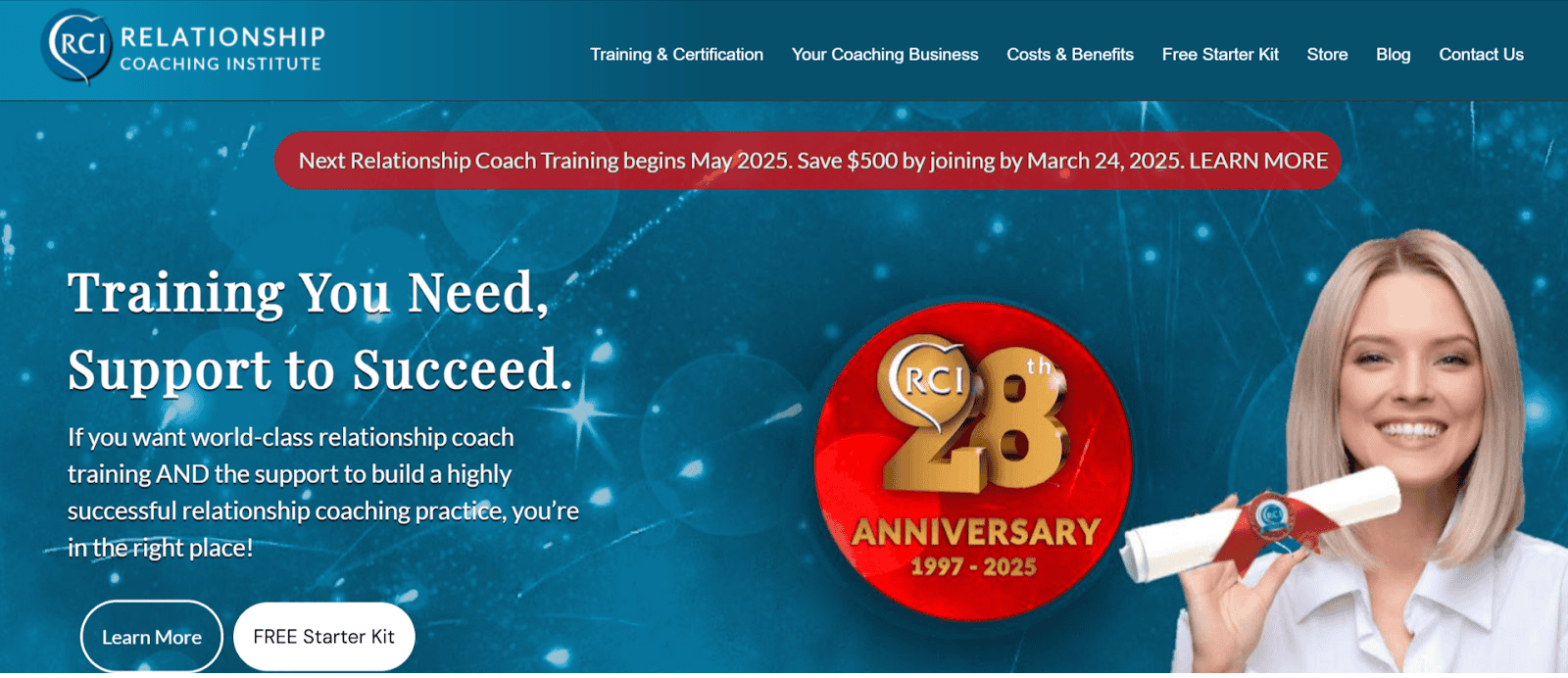
The Relationship Coaching Institute (RCI) offers training in relationship coaching. The core curriculum covers relationship dynamics, communication skills, conflict resolution, dating strategies, and marriage/partnership enhancement techniques.
Cost: Training programs cost around $3,997 for their comprehensive single or couple relationship certification tracks.
Somatica Institute

Somatica Institute provides somatic education and certification relevant to sex and relationship intimacy coaching. The core curriculum integrates somatic psychology, attachment theory, neuroscience, and experiential techniques focused on emotional connection, erotic embodiment, and sexual healing.
Cost: Certification programs cost around $7,900-$13,800 for the complete training.
The School of Somantic Sexology
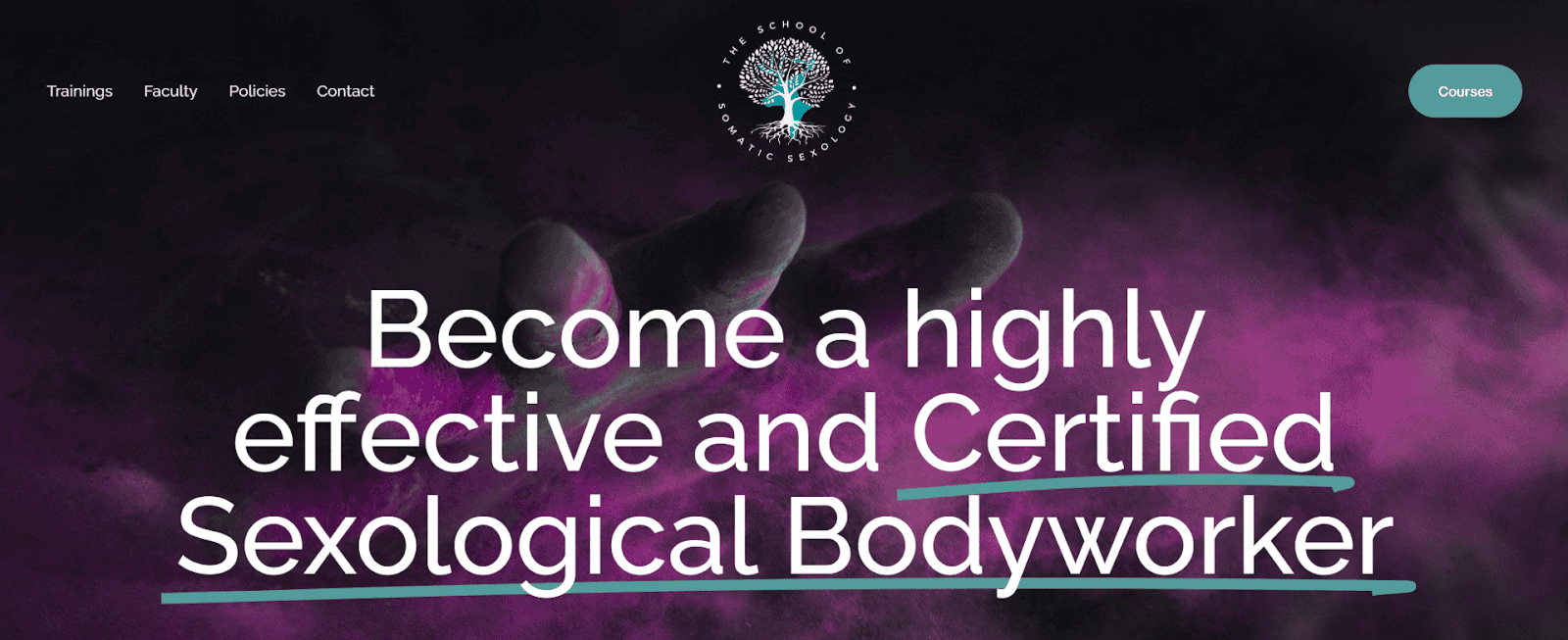
Sexological Bodywork certification programs by The School of Somantic Sexology offer training in coaching clients around embodiment. The core curriculum covers embodiment practices, consent-based touch, trauma awareness, sexual anatomy, and somatic awareness techniques for clients.
Cost: Programs cost between $3,387 and $7,829, approximately.
Association of Certified Sexology Bodyworkers

The Association of Certified Sexology Bodyworkers offers various sexology and intimacy certification programs. The core curriculum focuses on consent-based touch education, sexual anatomy, trauma-informed practices, and boundary setting for both practitioners and clients.
Cost: ACSB programs cost between $3,000 and $5,500, depending on the track and location.
Continuing Education Requirements
The field of intimacy coaching is constantly evolving. As an expert, you must commit to ongoing education in the latest research on human sexuality and relationships, cultural competence and inclusion, and ethics in coaching practice.
Legal Considerations and Ethical Guidelines
Before starting your intimacy coaching business, you should address legal and ethical concerns, such as:
- Laws in your jurisdiction regarding coaching vs. therapy
- Insurance requirements
- Business licensing needs
- Tax implications of your business structure
- Professional ethics guidelines from organizations like ICF or AASECT
Complementary Backgrounds and Expertise
Many successful intimacy coaches come to the field with complementary expertise such as:
- Yoga or movement instructors (for body awareness)
- Midwives or doulas (for comfort with bodies and transitions)
- Educators (for communication skills)
- Mental health professionals (for psychological understanding)
- Social workers (for systems perspective)
- Massage therapists (for professional boundaries around touch)
While these backgrounds provide a good foundation, specific intimacy coach training is still required.
Building Your Intimacy Coaching Business
Once you’ve developed the necessary skills and credentials, it’s time to build your business.
Define Your Niche
While it might be tempting to offer services to everyone interested in intimacy coaching, specializing in a particular niche allows you to go deeper and market more effectively.
- Do you want to work with couples, individuals, specific age groups, or LGBTQ+ clients?
- Will you focus on sex coaching, physical intimacy, post-trauma work, or something else?
Creating Your Coaching Packages
Intimacy work requires time and consistency. So, structure your offerings as coaching packages rather than single intimacy coaching sessions.
- Basic Package: A short-term option (perhaps weekly sessions for a month) for clients to explore specific questions or challenges.
- Standard Package: A medium-term commitment (about 3-6 months) for clients making big changes in their approach to intimacy.
- Elite Support: For some clients, particularly those working through complex challenges, monthly ongoing sessions provide continuity and accountability.
For each package, clearly outline the
- Number and length of sessions
- Timeframe for completion
- Additional resources provided
- Expected outcomes
- Investment required
- Policies on cancellation and rescheduling
You can create a landing page for your services with all this when you use Paperbell.
Systemizing Your Practice

Managing the admin side of an intimacy coaching practice can be tricky. But, using a coaching software like Paperbell can simplify your operations by:
- Allowing clients to book sessions directly through your personalized portal
- Automating payment processing
- Managing coaching agreements and consent forms
- Sending session reminders
- Tracking client progress
- Delivering pre-session questionnaires or homework
This automation saves you time and creates a professional experience for clients who may already feel vulnerable about seeking intimacy support.
Marketing an Intimacy Coaching Practice
An ethical marketing approach for sensitive topics requires thoughtfulness and respect. This includes strategies such as the following:
Using the Right Language and Imagery
Because intimacy is a sensitive topic, you should ensure you’re using the right images and words when reaching out to your audience.
- Use clear language that doesn’t give an exploitative hint
- Choose imagery that shows connection, not just bodies
- Consider cultural sensitivities around discussing intimacy
Build Trust With Content Marketing
Providing valuable content helps potential clients understand your approach while positioning you as a trustworthy expert. You can share:
- Blog posts on common intimacy questions
- Free guides on topics like “Difficult Conversations” or “Rebuilding Trust”
- Podcasts where you talk about your philosophy
- Short videos explaining intimacy concepts
- Free introductory workshops on general intimacy topics
Network for More Visibility & Credibility
Position yourself as a professional and grow your visibility. This will get you in front of more people and more intimacy coaching clients for your business.
You can do this through:
- Testimonials and case studies (with client permission and appropriate anonymity)
- Professional certifications and memberships
- Publishing articles in relevant publications
- Attending or speaking at events or on podcasts
- Teaching workshops through established organizations
Common Questions About Intimacy Coaching
What does an intimacy coach do?
An intimacy coach helps people develop deeper connections with partners, friends, family members, or themselves.
What happens in intimacy therapy?
Intimacy therapy is about diagnosing and treating mental health conditions that impact intimacy, digging into past trauma, and working with more severe dysfunction. It’s done by licensed mental health professionals, not intimacy coaches.
What’s the difference between an intimacy coach and an intimacy coordinator?
An intimacy coordinator works in films to oversee intimate scenes, ensure actor safety and consent, and improve communication between performers. Contrarily, an intimacy coach helps people develop real-life emotional and physical intimacy.
Do I need a psychology degree to become an intimacy coach?
No, a psychology degree isn’t required to become an intimacy coach. But understanding human psychology, relationship dynamics, and sexuality is.
How do intimacy coaches maintain professional boundaries?
Professional boundaries are maintained through ethical guidelines, clear contracts, and a transparent discussion of boundaries with clients.
Who typically seeks intimacy coaching?
People who want to improve their relationships seek intimacy coaching. This includes couples, individuals, those from conservative backgrounds, and people entering new phases of life (newly single, post-divorce, empty nest, etc.).
Is intimacy coaching the same as sex therapy?
No. Many intimacy coaches help clients develop comfort and skills around their sexual desires, but they don’t diagnose or treat dysfunction. Sex therapists can process sexual trauma and address clinical issues like vaginismus, erectile dysfunction, or compulsive disorders.
Becoming an Intimacy Coach
As a sex and intimacy coach, you create a safe space for others to build deeper intimate connections with their partners and themselves, at their own pace. If you’re looking for a system to support your intimacy coaching business through all levels of growth, you need Paperbell. It’s an all-in-one coaching and client management tool that handles bookings, payments, contracts, packages, and more. Try Paperbell for free today.
